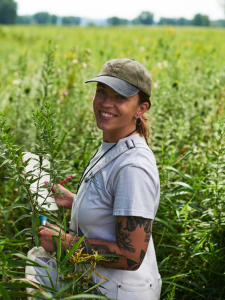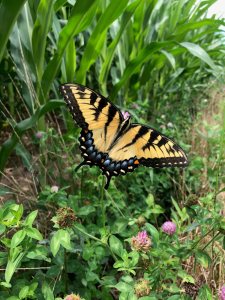
Lindsey Kemmerling, who completed her Ph.D. studies at W.K. Kellogg Biological Station in the Haddad Lab, is the recipient of a 2023 Royal Entomological Society Journal Award.
Insect Conservation and Diversity, the awarding publication, is a Royal Entomological Society journal that combines insect diversity and conservation, focusing on invertebrate preservation. The journal covers topics like biogeography, climate change impacts, conservation genetics, and global biodiversity.
Row crops, prairie strips and pollinators
Kemmerling was recognized for a research paper, titled “Butterfly biodiversity increases with prairie strips and conservation management in row crop agriculture.” The paper was co-authored by Annabelle McCarthy, KBS graduate student in the Haddad Lab; Cameron Brown, a former student in the KBS Undergraduate Research Apprenticeship program; and KBS resident faculty member Nick Haddad.
Of the paper, the award committee said, “The study is well-written with strong statistical analysis, and provides clear support for the multifunctional benefits of flowering ‘prairie strips’ in agricultural landscapes to promote insect species diversity and the conservation of threatened species. The work also demonstrates a really nice example of the value of long-term ecological research sites, especially their role in providing new experimental contexts for future research.”
Lindsey Kemmerling
Lindsey is a postdoctoral researcher at the University of Minnesota in Emilie Snell-Rood’s lab. Her research interests are at the intersection of biodiversity conservation, ecological restoration, and social justice; she is interested in research that has application to support biodiversity and advance social equity.

Her past work has focused on restoration within agricultural landscapes and the trade-offs and synergies this creates for biodiversity and ecosystem services. This work has implications for the conversion of up to 25% of monoculture farmland in the United States to restored prairie. Her recent work investigates urban pollutants, like heavy metals and microplastics, their bioaccumulation in insects, and remediation of polluted locations.
Of the study that garnered the award, Kemmerling said “We tested how restoring habitat in row-crop agriculture using ‘prairie strips’, in conjunction with other conservation management practices, can mitigate the loss of butterfly biodiversity. We implemented prairie strips in an experiment spanning a gradient from conventionally managed crops to conservation land and surveyed butterflies for three years.
Butterfly abundance and richness increased as land use intensity decreased. Prairie strips harbored unique butterfly communities and had a higher abundance than other management strategies, including conservation land. Prairie strips, while covering only 5% of the experimental plots, increased butterfly abundance and supported unique butterfly species at the whole plot scale.”
Congratulations, Dr. Kemmerling, on the award!

A legacy of conservation; a commitment to sustainability.
3700 E. Gull Lake Drive
Hickory Corners, MI 49060
(269) 671-5117
info@kbs.msu.edu